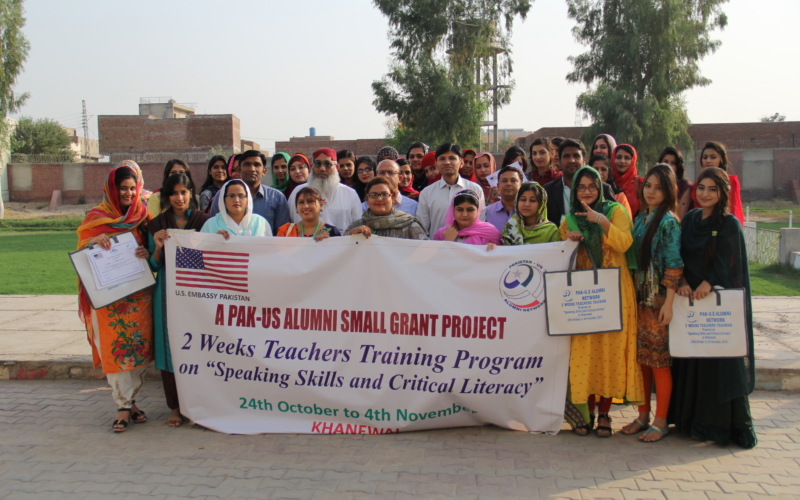27 Female Teachers Learn Innovative Pedagogical Methods
Ishrat teaches middle school children at the Bright Future Model School in Khanewal. This particular day, she decides to give her students flash cards and asks them not to open their books. She senses the excitement in the classroom as her students mouth the names of vegetables, drawn on the cards, to one another.
For Ishrat, having her students so involved in the classwork was something new. Previously, she had struggled with increasing student engagement in her classroom. That is why when she found out about a teachers’ training program happening in Khanewal, she instantly decided to enroll.
“From school, I would leave straight for the training that ran till 6:00 pm each day. Despite the hectic routine, the training has helped me boost my confidence by learning effective ways of communication and methods of teaching,” she says.
The project, “Teachers’ Training Program for Speaking Skills and Critical Literacy” was held in Khanewal from October 24, 2016 to November 4, 2016. The program engaged 27 female teachers from 10 schools in Khanewal for a first-of-its-kind teacher training program, designed and executed by Teaching Excellence and Achievement (TEA) and E-Teacher program alumnus Asad Qayyum.
This was made possible with the help of an alumni small grant from the Pakistan-U.S. Alumni Network (PUAN). All alumni of various U.S. government-sponsored exchange programs in Pakistan are eligible to apply for the grant of up to 5,000 USD to enable them to give back to their communities.
PUAN Education Conference Paves Way for Training Program
Qayyum, an English lecturer at Lawrence College, left his permanent job to come back to Khanewal. His desire to transform the educational system in the city led to him joining the Punjab School Education Department. He says, “When I started the E-Teacher program on critical literacy at University of Northern Colorado, I realized how we needed to adopt innovative methods in our approach towards teaching.” He shares that the exchange experience as a TEA fellow at Oregon State University exposed him to modern pedagogical techniques that he wanted to replicate for the teaching community at Khanewal.

Asad Qayyum, Project Head
Qayyum’s inspiration for the training design and development came about during the 2016 PUAN International Education Conference: Mapping Education in the 21st Century. “While attending Umer Hussain and Abbas Hussain’s sessions on student-centric teaching and critical thinking, I realized such a training was crucial for teachers in Khanewal who did not have access to such modern methods of pedagogy,” says Qayyum.
Training Introduces Innovative Pedagogical Methods
The 12 days training introduced teachers to role plays, creative ways of group creation, essential speaking skills, and critical thinking paradigms they could use in their classes to increase student engagement.
“The role play activity was one of my favorite assignments. It really helped me boost my confidence,” says Warda, a teacher at the City Public school.
Lubna, a teacher at the Salvation Army Schools, also felt that the training helped her improve her language skills. “The best thing is that now I understand how to stimulate the brain of my students and keep them actively engaged in the classroom.”

Participant reviews her notes from the program
For many of the teachers, this was the first time they were attending a training program catering to the skills enhancement of teachers. Zoya Tahira from Superior College was also a first-timer at such a training. “We did not quite understand the difference between critical thinking and criticize, however, the training program helped us understand the difference between the two and how we can effectively deploy critical learning as a teacher.”
The training concluded with 27 female teachers empowered with key critical literacy and speaking skills they will deploy in their classrooms to empower the young generation of learners. For Qayyum, this training is the first step towards truly innovating the educational system in Khanewal.

